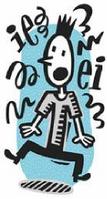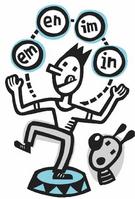Word Wisdom - How to spell like a champ
Published: Saturday | January 31, 2009

Did you feel a little tingle the first time you got a perfect score on a spelling test? Let's extrapolate (defined in Webster's Third New International Dictionary of the English Language, Unabridged: "predict by projecting past experience or known data") and imagine that that perfect score had earned you a big cash prize, a guest spot on a hot late-night talk show and your picture in every major newspaper in the country. Now we're talking more than a tingle. Most spelling bee champions would call it a pretty big buzz!
The National Spelling Bee, held each spring, is really just a more public, more difficult, but much cooler, spelling test, where a huge audience applauds every time you get a word right.
But even if you'll never be the last one standing - or rather, spelling - at the National Spelling Bee, there are still plenty of cool things to learn about how to spell words. Here, we've gathered some tips, tricks, lists and games to have you spelling like a pro in no time.
- Text and illustrations excerpted with permission from How to Spell Like a Champ, by Barrie Trinkle, Carolyn Andrews and Paige Kimble, illustrated by Robert Zimmerman.
VERY GENERAL RULES

Let's begin with the rules that apply across the board to words from every part of speech.
Rule 1: Deleting the silent 'e'
Drop the final 'e' before a suffix beginning with a vowel, unless all the following three criteria are met: (1) the word ends in '-ge' or '-ce', (2) the suffix begins with 'a' or 'o', and (3) the 'soft' sound of 'g' or 'c' is to be retained. Examples: alleging, intoning; advantageous, noticeable.
Rule 2: Doubling the final consonant
Double the final consonant before adding a suffix beginning with a vowel if the word has one syllable or an accent on the last syllable. If the accent shifts with the addition of the suffix, do not double the final consonant. Examples: abetting, beginner, rappelled; conference, reference.
Rule 3: Changing 'y' to 'i'
Words that end in y usually change the 'y' to 'i' before a suffix, unless the 'y' is the second of two vowels at the end of the word or the suffix begins with 'i'. Examples: happiness, silliest; grayness, boyish, flying.
Rule 4: Adding a prefix
Whenever a prefix is added to a word, the spelling of the word itself remains the same. Examples: mis- + shapen = misshapen; im- + mutable = immutable. This is one of the simplest rules to follow because it has no exceptions!
Rule 5: Placing 'i' before 'e'
It may be what we call a 'chestnut,' but the 'i'- before - 'e' spelling rule really does work most of the time. In this two-vowel combination (linguists call it a digraph when the two letters make a single sound), put the 'i' first unless the combination immediately follows a 'c', or has a long 'a' sound. Examples: believe; perceive, ceiling; vein, feint. If the two vowels are pronounced separately, as in science, concierge, and deity, they should be spelled as pronounced rather than according to the rule. This rule also does not include nouns ending in 'cy' that form a plural by changing 'y' to 'i' and adding 'es', like vacancy/ vacancies.
Most of the remaining common exceptions are:
caffeineneither codeineplebeian counterfeitprotein eitherreveille feistyseismic foreignseize forfeitsleight heifersovereign heightstein heirsurfeit heisttheir kaleidoscopeveil leisureweird
THE LONELY Q
There are just a very few words in English that use 'q' without its friend 'u':
faqih Qatari, qiyas, Inupiaq, qintar, taqlid, nastaliq, qiviut, zindiq
NEOLOGISMS
'Neologism' is defined in Webster's Third as "a new word, usage or expression". How new a word has to be in order to be considered a neologism is open to debate, but at some point in time, every word in the dictionary has been a neologism! Many neologisms start out as slang, but widespread and frequent use eventually gains them acceptance among linguistic traditionalists.
Note: The words below may not all be listed in Webster's Third.
applet, latte, bioterror, megaplex, cocooning, netiquette, defragmenter, olestra, emoticon, psychobabble, fashionista, spinmeister, gangsta, tatsoi, hoodie, velociraptor, hyperlink, wakeboard, intranet, yoctosecond, jihadist, yottabyte, kazillionzouk
TRICKY WORDS
The words that most people misspell generally fall into four categories: exceptions to well-known spelling rules, like seize; words with double letters, like accommodate; words with silent letters, like subpoena; and words containing a schwa (the usually unstressed vowel sound 'uh'), like separate ('SEP-uh-ruht'). Outside those main categories, a few words, like fiery, change the root spelling when a suffix is added; and some words, like hypocrisy, are just plain hard!

LANGUAGE TIDBITS
These languages don't commonly lend words to English, and the words we do have from them tend to be somewhat unfamiliar. However — hint, hint — they're often good spelling bee words!
In words of Afrikaans origin:
Familiarise yourself with letter combinations in words such as uintjie, Uitlander, uitspan, vaalhaai, volksraad, umfaan, aardvark, bobbejaan, geeldikkop, wildebeest, vetkousie. Make a list of unusual spellings for various sounds.
In words of Arabic origin:
Long 'e' is sometimes spelled 'ih': mihrab, ihram, faqih, tasbih, Lihyanic.
Many words are spelled more or less as they sound: mancala, masjid, kemancha, albetad, azoth, bejel.
There is sometimes a silent 'h': madhab, dhimmi, dhikr, dukhn, fellagha.
In words of Eskimo origin:
A 'k' sound is almost always spelled 'k': Eskimo, komatik, manak, kooletah, muktuk, anorak, kamik, makluk, kashim.
A 'k' sound is sometimes spelled 'q': qiviut.
In words of Hawaiian origin:
There are no silent letters such as the 'e' in hole.
WEIRD WORDS
It gets a lot weirder than the rule-breaker word 'weird.' What could be odder than a word that seemingly comes from nowhere? The words below have no known origin. Some are familiar but others leave you stranded without even a root word to hang on to.
askarel, lobscouse, bamboozle, marrowsky, bumicky, mumblebee, flabbergast, quandary, gyascutus, scrivello, huckaback, shenanigan, jitney, wingding, kentledge, yegg
HOW THE BIRDIES SING
Some onomatopoeically named birds talk about themselves all the time! Listen to the bobwhite, cuckoo, curlew, dickcissel, kiwi, motmot, siskin, towhee, whippoorwill and willet.
